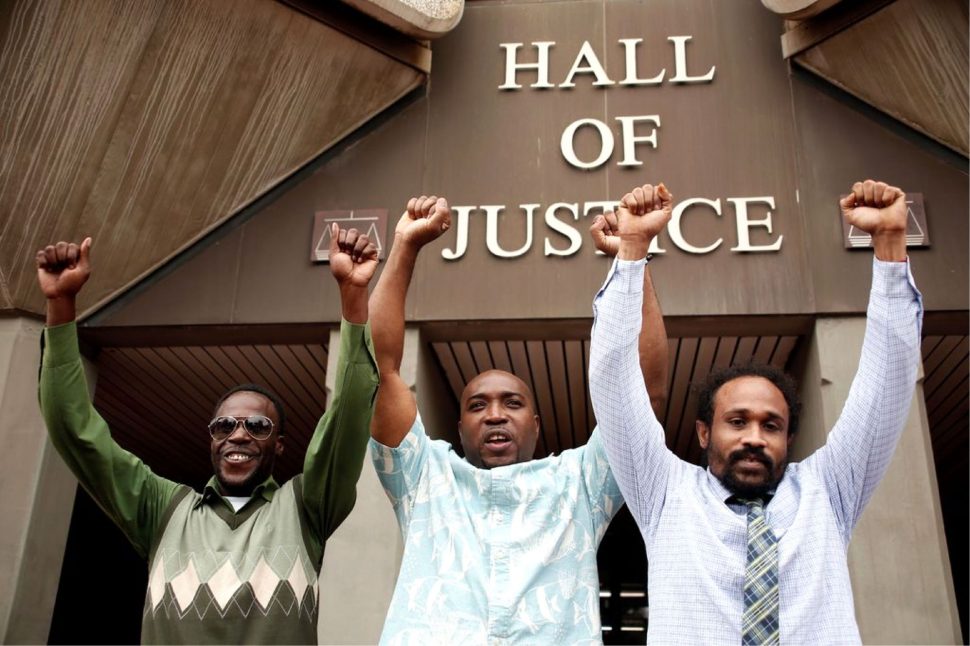(Trinidad Guardian) A decision by Director of Public Prosecutions (DPP) Roger Gaspard, SC, to continue to prosecute a triple murder case after the State’s main witness admitted to fabricating evidence has led to three men being freed.
After spending almost a decade on remand, Chris Durham, Ian Sandy and Deon Calliste walked out of the Hall of Justice in Port-of-Spain, as free men on Monday after High Court Judge Avason Quinlan-Williams upheld their novel judicial review lawsuit over Gaspard’s handling of their case.
In her 22-page judgment, Quinlan-Williams ruled that Gaspard’s failure to discontinue the charges against the trio, after learning of the witness’ admission, earlier last month, was unreasonable, improper and unfair.
“There is no remedy available to a judge presiding over a criminal trial to bring fairness to the trial process, on the face of what is known. The DPP is the only public office holder with the power to discontinue this prosecution and should have therefore decided, to so discontinue exercising the constitutional power afforded by section 90 of Constitution,” Quinlan-Williams, a former prosecutor, said.
As she ruled that Gaspard’s decision was not sensible, Quinlan-Williams criticised him for failing to give an explanation for it in the proceedings before her.
However, she commended State prosecutors Krishna Jaglal and Shabaana Shah, who claimed they informed Gaspard and the trio’s defence attorneys of the witness’ admission and raised concerns over continuing to prosecute the case.
“It is evident that the two prosecuting attorneys Mr Jaglal and Miss Shah did what was necessary to uphold the most noble tenets of the legal profession and of prosecutors in particular,” she said.
While she noted that the court’s willingness to interfere with the DPP’s constitutional remit was rare, she said it was justified based on the exceptional circumstances of the case.
Asked to comment on the ruling, Gaspard said he had not yet read the judgment as he had only returned to work from vacation yesterday.
Durham, Sandy and Calliste were charged with murdering Mubarak Calder, 15, Mentie Murai, 19, and Kevon St Louis during a shooting at a bottle factory at Factory Road in Diego Martin on April 21, 2009.
As pre-trial preparations were being done before Justice Devan Rampersad in the Port-of-Spain High Court, last month, the State’s main witness O’Neil Benjamin allegedly told prosecutors that he fabricated his testimony, which was the only direct evidence linking the trio to the crime.
Benjamin reportedly claimed that he was willing to continue to lie at the trial as there was a drop in crime within his community after the men were charged.
After being informed of what transpired, the trio’s attorneys attempted to obtain the notes of the conversation Benjamin had with the prosecutors but Gaspard never responded. The notes were eventually released after Rampersad ordered the disclosure.
The trio then filed the claim before Quinlan-Williams and the trial before Rampersad was put on hold pending the outcome of it.
When the trial came up for hearing, hours after Quinlan-Williams delivered her judgement, Assistant DPP Angelica Teelucksingh-Ramoutar attempted to circumvent the trio’s legal victory.
Teelucksingh-Ramoutar suggested that Rampersad was not bound by Quinlan-Williams’ ruling as they both preside in the same High Court jurisdiction.
“Without meaning any disrespect to Justice Quinlan-Williams, this case was before a senior criminal judge (Rampersad). This can be viewed as interference with the court’s jurisdiction,” Teelucksingh-Ramoutar said as she suggested that Benjamin’s evidence could have been challenged at an eventual trial by the defence.
Her claims were strongly opposed by attorney Gerald Ramdeen, who led the trio’s legal team in the civil challenge.
“It is a valid and subsisting order,” Ramdeen said.
After consulting briefly with attorneys from the Office of the Attorney General, Teelucksingh-Ramoutar agreed to withdraw her application as she noted that her office planned to appeal Quinlan-Williams’ decision. The men were then officially freed by Rampersad.
The trio was also represented by Wayne Sturge, Mario Merritt, Hasine Sheik, Alexia Romero, Danielle Rampersad and Karunaa Bisramsingh.
Call for review of all murder cases
In an interview after they were freed, the trio called for an independent review of all the hundreds of murder cases currently awaiting trial.
Calliste, who spoke on their behalf, claimed that the circumstances of their case were not unique and that many others in prison may earn a similar fate if their cases are reviewed.
“Don’t feel that because it have men charged for things that they did it. In the court, they (the prosecution) cannot prove it,” Calliste said.
He also sent a message of solidarity to other men awaiting trial for murder.
“All the brothers who are incarcerated, all yuh time coming soon. Continue to pray, fast and pay your attorneys,” he said.
While Calliste said he and his co-accused were elated to be freed, he still lamented over the slow rate of the criminal justice system.
“Imagine only after ten years they could prove that the witness lied. I write the DPP and others, pleading for them just to review my case and check it out and it was nothing,” Calliste said.
Speaking after Calliste, his attorney Gerald Ramdeen stated that the case set a major legal precedent.
“For the first time in the Commonwealth, the prosecutorial discretion of the DPP has been held to be unfair and unreasonable,” he said.
Like his clients, Ramdeen also suggested that the case proved that there was a need to review cases being pursued by the DPP’s Office.
“It calls for a serious investigation into the manner in which these prosecutions are taking place. There are other persons and other circumstances very similar to this one,” he said.
Asked if his clients planned to take addition civil proceedings to attempt to receive compensation from the State, Ramdeen said it would be considered.
“No matter what you do, you cannot give back these men the ten years in which they lost their liberty because somebody fabricated evidence against them,” Ramdeen said.





